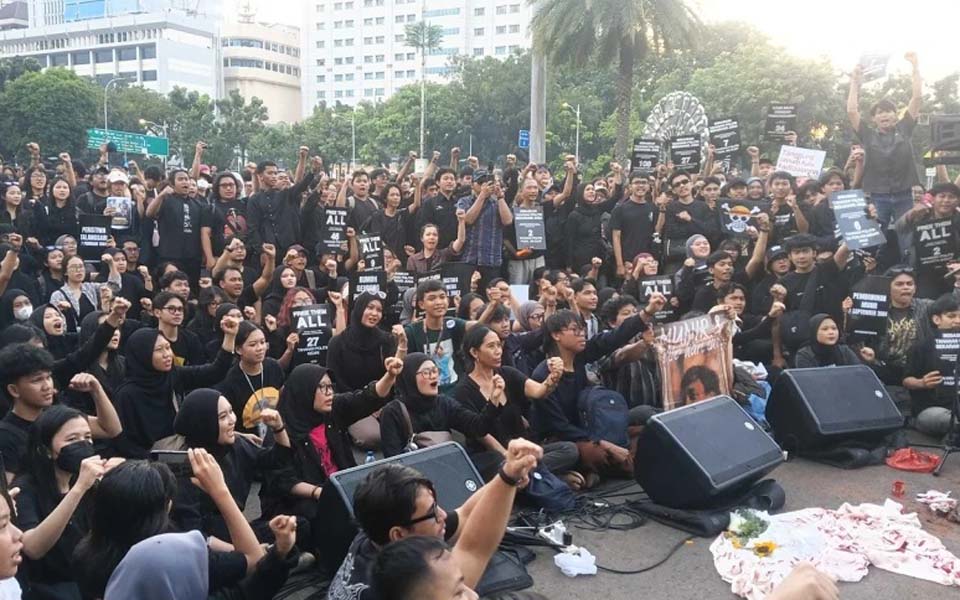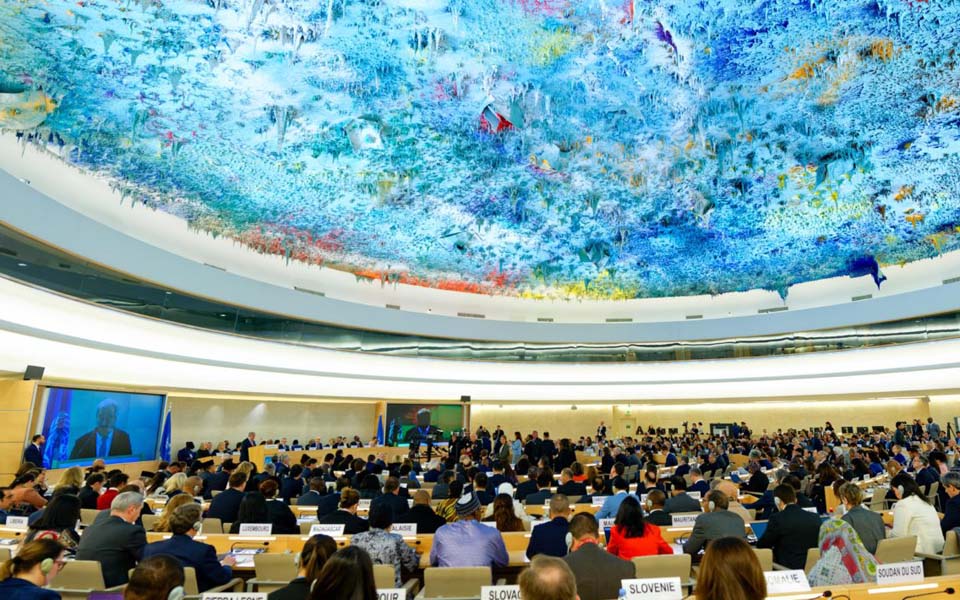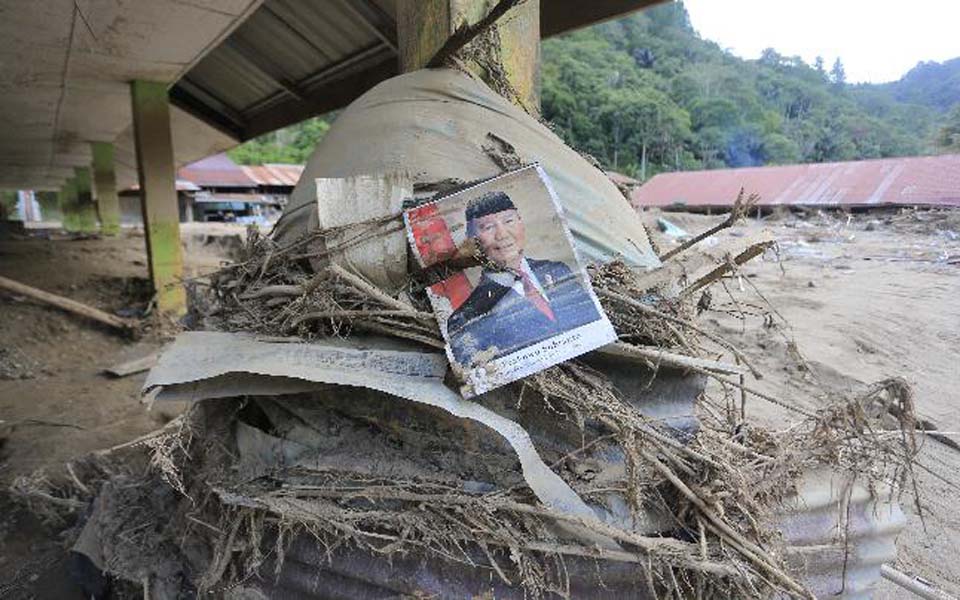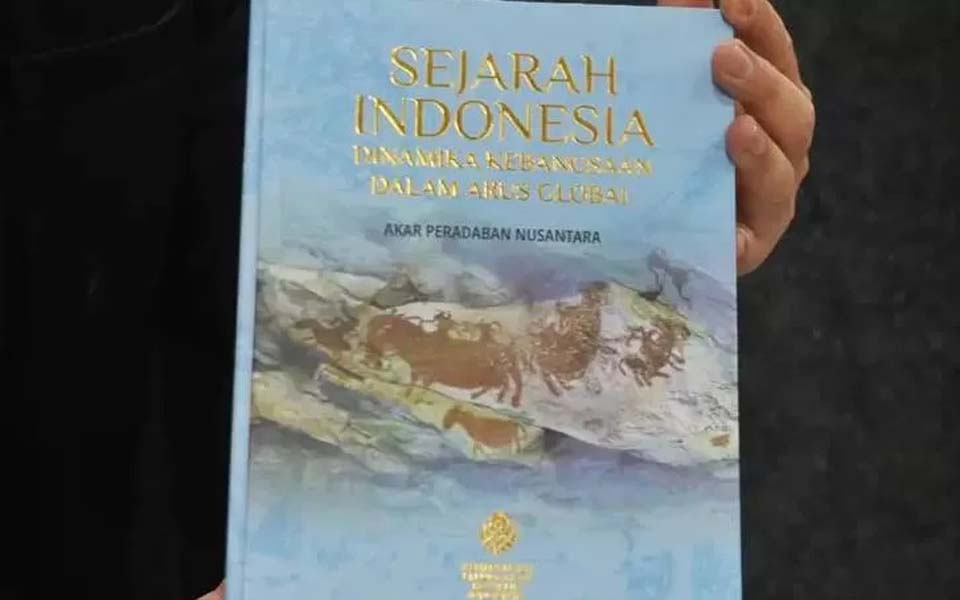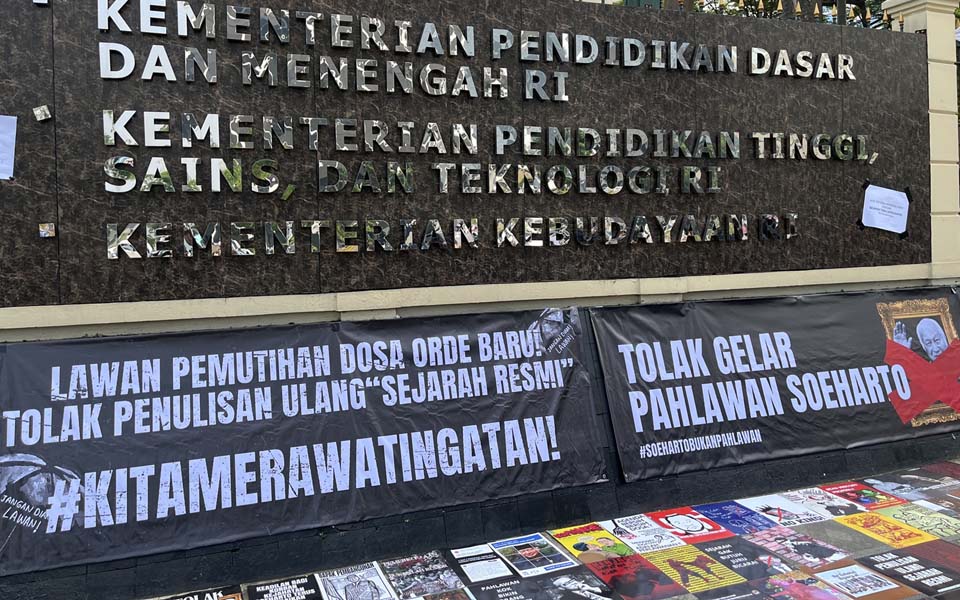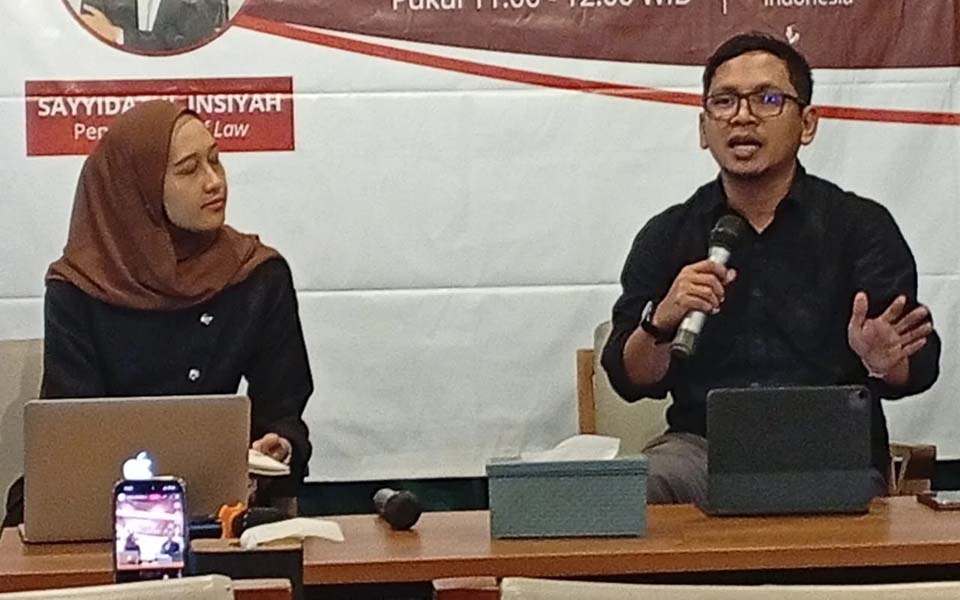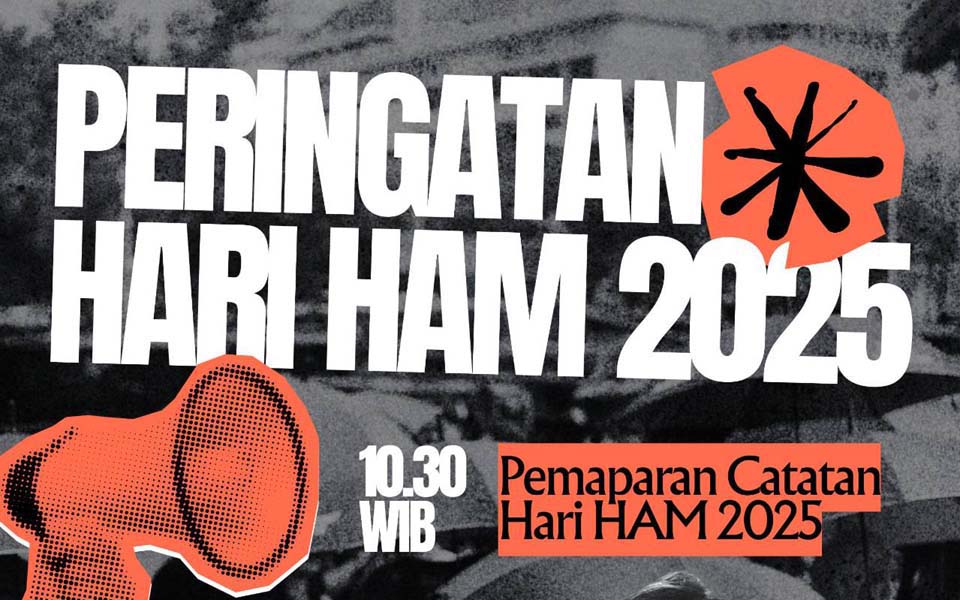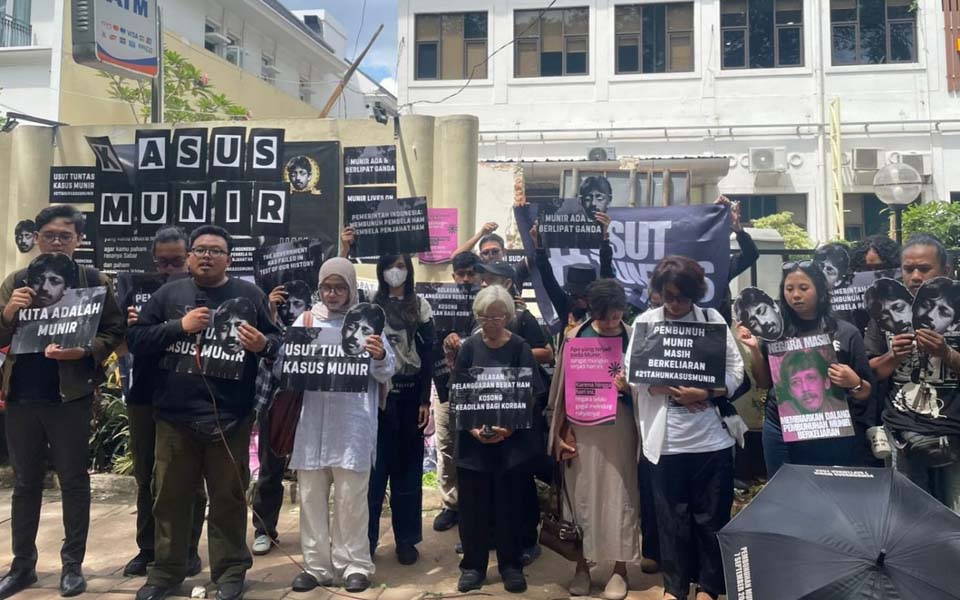Jakarta – The mass rapes during the May 1998 riots in Jakarta accompanying the wave of demands for reformasi or political reform that that brought down the New Order regime (Orba) of former president Suharto, has again become the subject of discussion recently.
This is tied to the history rewriting project initiated by the government through the Ministry of Culture under the leadership of the Minister of Culture Fadli Zon. The polemic began following a media interview in which Zon said there was no evidence of violence against women, specifically mass rapes during the 1998 affair.
Then at a meeting with the House of Representatives (DPR) Commission X on Wednesday July 2, Zon was again criticised by the people's representatives, especially those with a background in history and women's rights. On that occasion, the Greater Indonesia Movement Party (Gerindra) politician claimed that he acknowledged that sexual violence occurred, but then narrowed this by questioning the use of the term "mass".
Zon claimed not to have any hidden agenda behind this claiming he does not intend to reduce or eliminate the historical facts during the event.
Zon's statement was then refuted by several DPR members at the Commission X meeting from the Indonesian Democratic Party of Struggle (PDI-P) faction. The PDIP faction has even asked for the Indonesian history rewrite project to be stopped for now.
"We from the PDI-P faction state, ask that the history writing project just be stopped. Stopped, just like that. That is our position", said PDI-P faction member Bonnie Triyana in his presentation during the meeting.
Triyana, who has a background as a historian, admitted to being concerned that the history rewriting project under Zon is form of state denial of human rights violations or the denial of humanitarian violence.
According to Triyana, there are three forms of denial that are allegedly being carried out by the state through the history rewriting project. First, literal denial or a form of direct denial of cases of human rights violations.
Second, interpretive denial or form of denial that is reinterpreted and reduces the impact on victims. Third, implicatory denial or accepting the incidents of human rights violations, but does not doing anything or not taking responsibility for them.
"So the state doesn't want to take responsibly. Now I'm worried that what has been happening lately includes interpretative denial. So the minister admits [the incident], but there's a kind of interpretation of the meaning of 'mass' which then shifted our debate into a semantic debate", Triyana said.
"Not to the substance of the problem itself. Therefore [the cases of mass sexual violence] occurred", he added.
Amnesty International Indonesia Executive Director Usman Hamid said there are at least two reasons why the political elite today are reluctant to recognise the history of mass rapes during the 1998 riots.
First, Hamid is of the view that there are concerns on the part of the government that if there is pressure to uncover the truth behind the tragedy of the mass rapes and the 1998 riots this has the potential to drag down people in the government today who are implicated in the May 1998 affair.
"There are concerns that if the public continues to push for the tragedy of the mass rapes and the May 1998 riots to be revealed it will in fact drag down people in the current government who have been implicated in the May 1998 cases", Hamid told CNN Indonesia on Thursday June 3.
Then secondly, Hamid said that the political elite still adheres to a systemic racism against the ethnic Chinese in Indonesia.
"It is not uncommon for the elites to use anti-physical and anti-foreign rhetoric to blame them while at the same time covering up the state's failures to realise social justice", said the former coordinator of the Commission for Missing Persons and Victims of Violence (Kontras) management board.
Hamid said that this rhetoric was also often used to garner support from those who believe in the negative labialising of ethnic Chinese.
Both those who believe in the economic stigma that ethnic Chinese control the national economy and political stigma such as communist accusations. "This is a legacy of the New Order that has not yet been completely abolished", he said.
Injuring the memory of victims and the community
Meanwhile human rights activist and Lokataru Foundation founder Haris Azhar said that it is sad to see what Zon has been doing lately. He said the memories of the victim and the wider community have persisted for a very long time.
"The memories of the victims, the families, and the wider community has been recorded and remembered. The memory has become a 'maqam' (marker). These wounds and grief have persisted for almost three decades", said Azhar.
He stated that these memories have not persisted without reason, but the event at that time have left behind really terrible memories .
Azhar also questioned why the government under President Prabowo Subianto is only now "busy" correcting history or diction that is already a part of the public memory.
"I see that it is sad and funny what Fadli Zon is doing, why the government is 'only now' busy correcting history or the words that have become public memory", he said.
Azhar also gave a message to Zon not to tinker around with the history surrounding of the 1998 affair. He said that if it continues, it will come to bite back like a boomerang.
"If you are not able to provide justice for the real truth, you should just leave it alone, my suggestion to Fadli Zon. Don't try to tinker around with the issue of 1998, later it will backfire", said the man who also once led Kontras.
Azhar stressed that the state's task is to facilitate the recovery as a result of the events. According to Azhar, if indeed government officials and their staff did not understand this, then carry out a historical investigation first.
"There's still a lot of material, there are still many victims and witnesses. Don't embezzle the facts in the name of writing history", he said.
Similarly, Hamid also requested that the historical rewrite project be stopped. He requested that the events around the May 1998 riots be clarified more deeply.
"It's best that this rewrite be stopped and the May 1998 riots clarified first through an investigation by the Attorney General and prosecution through an ad hoc human rights court so it can be examined by judges", said Hamid.
Separately, National University (Unnas) historian Andi Achdian also requested that the historical rewriting project be stopped. He believes that right from the start the project has attracted controversy.
He then highlighted the Ministry of Culture's plan to later conduct a public test on the work of the team saying that he does not rule out the possibility that this will just be carried out as a mere formality.
"I'm also not convinced that in the public testing process it will also be carried out in a process that is open, it will be done on the sly like that, the important thing is that there is one, a public test", Achdian said.
Whitewashing behind history rewrite
Not only that, Achdian claims to have got wind of a tendency of whitewashing in the project. Whitewashing is an act of covering up or removing a crime in order to free the guilty person. The practice is at the same time to restore a person's reputation.
He is of the view that Zon's statement questioning the diction "mass" in the rape cases during the May 1998 affair substantiate his doubts. "The statement issued confirms a position, I don't know whether it's a personal position or the government's position", he said.
Achdian suspects that Zon wants to delegitimate the public's collective memory of the mass rapes that occurred during the May 1998 riots. Therefore, he also doubts the accountability of the history rewrite. He does not believe Zon's claim that his is not intervening in the project.
"This is a process for how the state can be released from the demands of accountability. Victims lose legitimate space to speak out and so on", he said.
CNN Indonesia has also requested a response from the head of the history rewriting team, Susanto Zuhdi, but person concerned has not yet responded.
History rewrite to continue
Meanwhile, while he was in Maros, South Sulawesi, yesterday, Zon stressed that he would still continue with the Indonesian history rewriting project even though a number of parties have requested that it be stopped.
"[On Wednesday] the other day I explained in the DPR, that this rewriting of history will continue and we are involving 130 historians, historical experts", said Zon on Thursday.
According to Zon, the history rewrite will be continued and after its completed then it will proceed to a public test. "So we'll continue, later when it's time we'll conduct a public test, also this month", he said.
Zon explained that the writers in the historical rewriting project are historians that come from 34 campuses in Indonesia. "For now, we'll write 10 chapters, but not (in) detail, of course, including from the initial findings", he said.
Zon later said that in the last 26 years the Indonesian nation had never written a national history, even though this is very important for society. (mnf/kid)
Notes
President Prabowo Subianto has been accused of playing a central role in sparking the May 14, 1998 anti-Chinese riots in Jakarta that saw hundreds of ethnic Chinese women raped and murdered and more than a thousand people killed. At the time, Prabowo was head of the Army's Strategic Reserves (Kostrad) based in Jakarta. In 2003, the National Commission on Human Rights (Komnas HAM) accused Prabowo of responsibility "for gross human rights violations that occurred during the extensive rioting in Jakarta in 1998". The Komnas HAM report said that "security authorities at that time failed to curb the widespread riots that took place simultaneously". The spread of the riots was a result of a specific policy based on the "similar pattern at almost all places where the riots took place, which began with provocation, followed by an attack on civilians". The Joint Fact Finding Tram (TGPF) formed by then president BJ Habibie recommended that Prabowo along with Sjafrie Sjamsoeddin, then the commander of the Jakarta Military Regional Command and now Defence Minister, should among others be held accountable.
[Translated by James Balowski. The original title of the article was "Polemik Sejarah Pemerkosaan Massal '98".]






